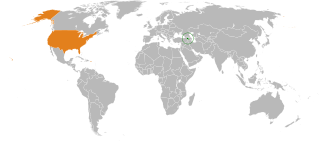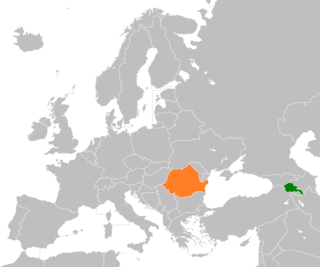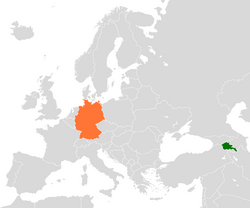
Since its independence, Armenia has maintained a policy of trying to have positive and friendly relations with Iran, Russia, and the West, including the United States and the European Union. It has full membership status in a number of international organizations, such as the Council of Europe and the Eurasian Economic Union, and observer status, etc. in some others. However, the dispute over the Armenian genocide of 1915 and the ongoing Nagorno-Karabakh conflict have created tense relations with two of its immediate neighbors, Azerbaijan and Turkey.

Cem Özdemir is a German politician who currently serves as Federal Minister of Food and Agriculture since 2021. He is a member of the Alliance 90/The Greens party.

Diplomatic relations between Armenia and Turkey are officially non-existent and have historically been hostile. Whilst Turkey recognised Armenia shortly after the latter proclaimed independence in September 1991, it has refused to establish diplomatic relations. In 1993, Turkey reacted to the war in Nagorno-Karabakh by closing its border with Armenia out of support for Azerbaijan, which remain closed to this day despite sporadic negotiations regarding possible opening.

Bilateral relations exist between Armenia and Greece. Due to the strong political, cultural and religious ties between the two nations, Armenia and Greece today enjoy excellent diplomatic relations. They have always been strong both emotionally and historically due to religious and cultural roots and co-existence during the Byzantine period and under the Ottoman Empire.

Relations between Armenia and France have existed since the French and the Armenians established contact in the Armenian Kingdom of Cilicia in the 12th century. Formal diplomatic relations between Armenia and France were established on 24 February 1992. Due to the good relations between the two countries, 2006 was proclaimed the Year of Armenia in France.

The dissolution of the Soviet Union in December 1991 brought an end to the Cold War and created an opportunity for establishing bilateral relations between the United States with Armenia and other post-Soviet states as they began a political and economic transformation. The United States recognized the independence of Armenia on 25 December 1991, and opened an embassy in Armenia's capital Yerevan in February 1992.

Bilateral relations exist between Armenia and Croatia. Diplomatic relations between the countries were established on 8 July 1996. Armenia is represented in Croatia by its embassy in Rome, Italy, while Croatia is represented in Armenia by its embassy in Athens, Greece. In 2011, both countries have established honorary consulates, Armenia's residing in Zagreb, while Croatia's residing in Yerevan, the capitals of the respective countries.

Foreign relations exist between Armenia and Switzerland. Switzerland recognized Armenia as an independent state on 23 December 1991. The two countries have maintained diplomatic relations ever since. Both nations are members of the Council of Europe and the Organisation internationale de la Francophonie.

Foreign relations exist between Armenia and Bulgaria. Both countries are full members of the Organization of the Black Sea Economic Cooperation and the Council of Europe. Both nations maintain embassies in their respective capitals.

Current and historical relations exist between Armenia and Denmark. Armenia has an embassy in Copenhagen, and Denmark is represented in Armenia, through its embassy in Kyiv, Ukraine. Diplomatic relations were established on 14 January 1992. In 2008, the Armenian Foreign Minister Eduard Nalbandyan called the relations between Armenia and Denmark "friendly" and "highly appreciating". In 2013, Amstream was founded as an independent non-political and non-profit organization in order to initiate means of collaboration and partnerships between Armenia and Scandinavia within business, education and culture. Both countries are members of the Council of Europe.

Armenia–Romania relations refer to the bilateral relations between Armenia and Romania. Both countries established diplomatic relations on 17 December 1991. Armenia has an embassy in Bucharest and Romania has an embassy in Yerevan. Both countries are members of the Organization of the Black Sea Economic Cooperation, the European Political Community, and the Council of Europe.

Foreign relations exist between Armenia and Portugal. Neither country has a resident ambassador. Armenia is represented in Portugal through its embassy in Rome (Italy). Portugal is represented in Armenia through its embassy in Moscow. In addition Portugal is represented in Armenia through its honorary consulate on Nalbandyan street in Yerevan. The consul is Mr. Samuel Samuelyan.

Canada and Turkey have maintained diplomatic relations since 1943. Both countries are members of the G20, NATO, Organization for Economic Co-operation and Development, Organization for Security and Co-operation in Europe, United Nations and the World Trade Organization.

North Macedonia–Turkey relations are the bilateral relations between North Macedonia and Turkey. Both countries are full members of the Council of Europe and of the NATO. North Macedonia has an embassy in Ankara and a Consulate General in Istanbul. Turkey has an embassy in Skopje.

Foreign relations have reportedly always been strong between Armenia and Cyprus. Cyprus has been a supporter of Armenia in its struggle for the recognition of the Armenian genocide, economic stability and the resolution to the Nagorno-Karabakh conflict. In return Armenia has been advocating a stable Cyprus after the Turkish invasion in 1974 and supporting a lasting solution to the Cyprus dispute.

Armenia–Spain relations are the bilateral relations between Armenia and Spain. The importance of relations centers on the history of Armenians migration to Spain. Approximately 40,000 Armenians and their descendants reside in Spain. Both nations are members of the Council of Europe and the OSCE.

Diplomatic relations exist between Armenia and Chile. There are over 600 Armenians and descendants residing in Chile today. Both nations are members of the United Nations.

Armenia–United Arab Emirates relations are the diplomatic relations between Armenia and the United Arab Emirates. Official relations exist between both nations since 1998. Armenia has an embassy in Abu Dhabi and a consulate in Dubai. The United Arab Emirates has embassy in Yerevan.

Bilateral relations exist between Armenia and Iraq. Armenia has an embassy in Baghdad, and Iraq has an embassy in Yerevan.

Bilateral relations exist between Armenia and Italy. Armenia has an embassy in Rome and Italy has an embassy in Yerevan. Both countries are full members of the Council of Europe and the OSCE.























